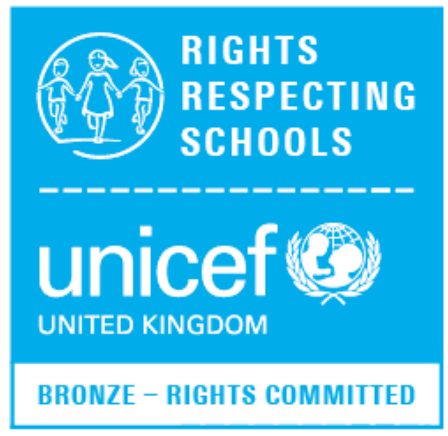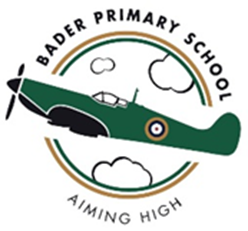Rights Respecting School
Curriculum Statement for the teaching and learning of Right Respecting School in 2021-22
INTENT |
The award aims to improve the lives of children in the UK by taking a whole school approach in putting children’s rights at the heart of school policy and practice in line with the school’s values resulting in:
Child Rights Education, through RRSA, often enhances and strengthens effective practice within a school, with adults also creating more positive relationships and enjoying their role. Rights have been described as a ‘heartbeat’ in school life; like a ‘golden thread’ or ‘stick of rock’ that underpins and informs their practice. In a Rights Respecting School, a child rights-based approach underpins school culture, ethos and relationships as well as the more tangible changes to practice, policy and environment. When children leave Bader Primary School they are well prepared in recognising life is a fantastic adventure to enjoy. |
||
KEY Focus |
Active |
Safe In School |
Respectful |
Children demonstrate skills taught during each lesson and are actively involved in promoting their rights through verbal interaction. |
Children recognise what it means to be safe in school and can express their feelings to show what it looks like. They can say if a situation makes them feel unsafe. |
Children are taught the Bader Values alongside the Convention of Rights enabling them to express opinions in a respectful manner. |
|
IMPLEMENTATION |
Broad and Balanced Curriculum |
||
Enrichment |
|||
Leadership |
|||
IMPACT |
The Unicef Rights Respecting Schools Award improves the lives of children in the UK by taking a whole school approach to putting children’s rights at the heart of school policy and practice.
|
||
Evidence: Knowledge, Skills and Understanding
|
Pupil Voice: |
||
Rights Respecting Schools Award
At Bader Primary School, we wish to engage children in taking an active role in how school promotes social and emotional well-being. The rights respecting school award is a way of children recognising their contributions are valued and that their views can create a change, making it a better place, through a structured journey in achieving bronze, silver and gold awards. Not only does it improve school life, but also reaches out to the local community and around the world. The children at Bader know they are an important part of making the world a better place, starting with their immediate environment.

The rights respecting school journey takes the participants through bronze, silver and gold accreditations.
Bronze Award
The bronze award is achieved through the introduction of a rights based approach in school:
- Staff are made aware of the journey and are asked their opinions;
- Children are introduced to the rights based approach through assemblies and teacher inputs. Their views are collected;
- Parents are informed;
- Governors are informed and views collected;
- Steering group (who will be responsible for sharing ideas with their class) is created;
- An action plan is created to identify the next steps in achieving the silver award;
- The school context is taken;
- All views are collated. This is then used as a starting point.
We have achieved the Bronze Award in May 2020 and are a Bronze – Rights Committed School.

Silver Award
The silver award is achieved by delving deeper and explicitly embedding the UN Convention on the Rights of the Child into policy, practice and culture. It promotes knowledge and understanding of the Convention throughout your school community and develops through the stages of the action plan previously created. As this develops, children and staff become more positive. This becomes more visible, improving the school ethos, practice and environment. Children and adults begin to see themselves as rights respecting global citizens and advocates for fairness and children’s rights, both locally and globally.
Progress towards the RRSA tends to happen organically. What we are aiming for is:
- Teaching and Learning about rights: for the whole school community through training, curriculum, assemblies, topics, focus days/weeks, displays;
- Teaching and Learning through rights: by modelling rights respecting language and attitudes, and making strategic decisions that involve students;
- Being ambassadors for the rights of others: developing as rights respecting citizens.
Gold Award
Achieving Gold: Rights Respecting means there is evidence that:
- Your school has explicitly adopted a child rights approach based on the United Nations Convention on the Rights of the Child and has embedded it in school policy, practice and culture;
- Children, young people and adults in your school have a thorough understanding of child rights, and rights respecting attitudes and language are embedded across the school;
- RRSA has had a positive impact on children and young people’s learning and wellbeing;
- Students see themselves as rights respecting global citizens and are advocates for social justice, fairness and children’s rights at home and abroad.
Children and young people also play an increasingly leading role in driving progress. At Gold: Rights Respecting, you are aiming to intensify and broaden:
- Teaching and Learning about rights: for the whole school community through training, curriculum, assemblies, topics, focus days/weeks, displays;
- Teaching and Learning through rights: by modelling rights respecting language and attitudes and making strategic decisions that involve students;
- Being ambassadors for the rights of others: developing as rights respecting citizens.

